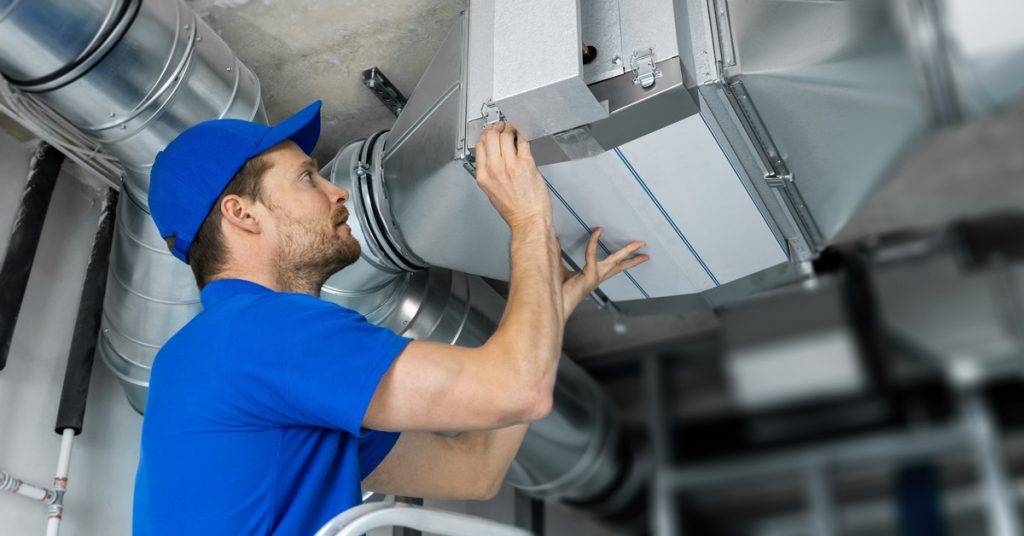As part of our air filtration series, we have spoken a lot about HEPA filtration and HVAC systems and we get a lot of inquiries from clients about the possibility of combining both and installing HEPA filters into HVAC systems. Is it possible? Let’s find out if they are viable.
What is a HEPA?
First, let’s talk about what exactly HEPA-filters are. Medical grade HEPA-filters are capable of removing 99.95% of particles like dust, smoke, mould, bacteria, pollen, spores and some viruses like COVID-19 as small from the air.
Unlike smaller and cheaper purifiers, HEPA-filter purifiers do not produce Ozone which can also produce side effects on human health. HEPA-filters can be found in portable air purification units.
What is a HVAC?
Meanwhile, HVAC (Heating, Vents, Air Conditioning) commonly refers to the different systems used to move airflow around homes and workplaces. HVAC is not necessarily one system, some buildings have their heating and cooling combined, some don’t and that’s ok too, the way HVACs are built vary between buildings.
HVAC systems are responsible for the regular movement of airflow around a building. HVACs were the unspoken heroes of the COVID-19 pandemic and even though they do not purify the air, they do create airflow which can slightly reduce the risk of airborne transmission.
Can HEPA be combined with HVAC?
Which brings us to our main question, can you install HEPA-filters into a HVAC system? In most cases, the answer is no. There are some hospitals and medical laboratories that have HEPA-filtration built into their HVAC systems but for most workplaces it might not be viable.
Here’s why:
Reduces airflow
Installing a HEPA-filter into your HVAC system reduces airflow. It takes extra time for the air to be pushed through a thick HEPA-filter and this can bottleneck and cause increased pressure issues in existing systems.
Dramatically decreases effectiveness of the system
With bottlenecks, HEPA-filters can decrease the effectiveness of HVAC systems as they start to turn less air over.
Likewise, pressure build up can cause air to escape around the HEPA-filter, not through it, meaning the air has not been purified and rendered the purifier less effective.
Fan burnout
As part of a chain reaction, HEPA-filters not properly installed into HVAC systems can reduce airflow and decrease the systems effectiveness. Making the system work harder which can lead to fan burnout that can be difficult and expensive to replace.
Expensive Running Costs
HEPA-grade HVAC systems that operate in laboratories and hospitals have expensive running costs due to the increased amount of power they use. These systems need to be run 24/7 and consume a lot of energy. Whilst the need for patient safety and product quality makes running these expensive systems worthwhile for laboratories and hospitals. It may not be viable for small businesses.
Switching and design costs
HEPA-grade HVAC systems are best installed when a building is under construction. Trying to install a HEPA-filter into an existing HVAC system is an expensive process. Depending on the size of the existing HVAC system, a compatible HEPA filter may be difficult to source or one may have to be custom built. Not to mention the difficult process of taking out ceiling panels to install the HEPA system.
The easier way to combine HEPA and HVAC systems
The information above may make installing a HEPA-filter into a HVAC sound off putting but there is an easier way. Portable HEPA-grade air purifiers are very effective at removing particles by themselves.
If your risk profile allows it, you can install your HEPA-grade air purifier near a HVAC vent with inflowing air, your purifier can purify the incoming air before it flows further into the room.
Weary of false advertising
The pandemic has seen an influx of fraudulent medical devices come to the market. Due to the expensive and complex production of HEPA/HVAC systems, be weary of the marketing of combined systems. Genuine HEPA/HVAC systems are usually found in laboratories and hospitals, so systems marketed towards personal and small business can be a red flag.
There is a lot of ‘HEPA-like and 99% HEPA’ fraudulent HEPA filter products too. Genuine HEPA/HVAC systems can be found by certified ventilation specialists, they can take time and money to build. Anything less than this can be a red flag.
Westlab is a certified supplier for genuine Aeris Air purifiers.
Key takeaways
- HEPA/HVAC systems are costly and rarely found outside medical institutes.
- The best way to combine the two is to install a HEPA-grade air purifier to purify the air and have the HVAC system running simultaneously.
- Be weary of false HEPA/HVAC claims.
Regardless of the size of your workplace, we should all focus on quality air filtration in the best interest of everyone’s health.
Westlab are the exclusive distributor for Swiss-designed and engineered Aeris Aair Range,To purchase an Aeris Aair filter or a wide range of medical products, contact Westlab today
